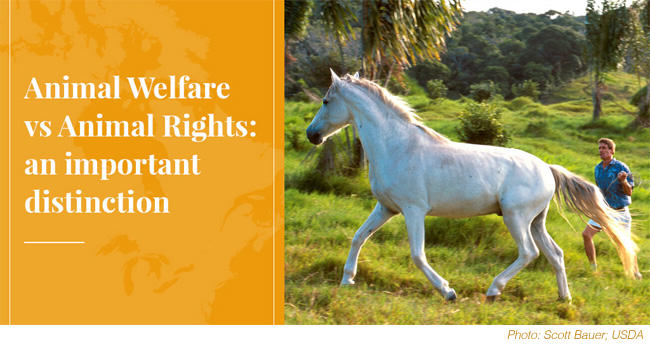
The public debate about fur (and other animal products) is often distorted by confusion between two important concepts: animal welfare and animal rights. These terms sound similar and are often used interchangeably, but they describe two profoundly different ideas. Caring about the welfare of the animals we use – for food and other purposes – is very different from assigning them the rights that activist groups are now proposing.
Do you believe that farm animals should be treated humanely and spared unnecessary suffering? Then you are a proponent of animal welfare. Animal-rights advocates, by contrast, argue that humans have no right to use animals at all – not for food, clothing, or anything else. They believe that all livestock production should be shut down completely. “Not better cages, no cages at all!” is their rallying cry.
It is rare that we agree with PETA on anything, but its views on the chasm separating animal welfare and animal rights are spelled out clearly on its website for all to see:
“Animal rights means that animals are not ours to use for food, clothing, entertainment, or experimentation … Animal welfare allows these uses as long as ‘humane’ guidelines are followed.”
Let’s see how this distinction plays out in the real world.
Eating Meat, Fish and Dairy
Animal-welfare advocates have worked for the past 100 years to ensure that the animals that provide us with meat, dairy products and eggs receive good nutrition and care. Thanks to their efforts we have humane-slaughter regulations, codes of practice and other provisions to minimize stress and suffering. This is an on-going process. For example, while modern production methods have made animal protein more affordable for millions, promoting healthy brain development for infants and children, they also raise new animal-welfare challenges.
Animal-rights advocates do not seek better conditions for farm animals. Rather, they oppose all killing and consumption of animals no matter how humanely this is done. Their openly-stated goal is to shut down all livestock farms and to end the consumption of meat, dairy, eggs, and any other animal products – even honey. They demand everyone becomes “vegan”, and argue that animal-welfare improvements only serve to justify what, for them, can never be justified, i.e., the killing of animals.
Wearing Leather, Fur, Wool and Silk
Again, animal-welfare advocates work to ensure that animals used for the skin, fur, feathers, hair, or other materials are treated humanely, with minimal suffering. Their efforts have driven North America’s world-leading trap-research program, and the development of codes of practice for fur farms.
Animal-rights campaigners oppose any use of all animal products for clothing or accessories. They often show examples of shocking abuse in their campaigns against fur, leather, and wool – which can make it look like they are concerned about animal welfare – but their goal is not better standards or regulations. They don’t believe humans have a right to use animals at all, which means no more wool, leather, fur, cashmere, down or even silk.
Owning Pets
Animal-welfare advocates believe that owning a pet is a privilege that comes with responsibilities. A pet needs to be housed, fed, and cared for properly, to ensure an acceptable level of well-being.
Animal-rights activists consider pet ownership to be a form of slavery. In their Brave New World there would be no more cats, dogs, fish, hamsters, bunnies, budgies, or other pets. In fact, the shocking kill-rate at PETA’s “shelter” confirms that it prefers to euthanize pets rather than find new homes for them, despite receiving more than $50 million annually from well-meaning donors.
Animals for Entertainment
Zoos, circuses, racetracks and other activities that use animals for entertainment are obliged, by law, to respect the welfare of their animals, ensuring they receive appropriate nutrition, housing and care.
Animal-rights activists, by contrast, want to ban all such activities. If they have their way, there will be no more animals in circuses, no more horse-back riding or dog shows, not even zoos that support breeding programs for endangered species. If giant panda conservation had been in PETA’s hands rather than those of the Chinese government, it would probably be extinct by now.
Animals for Medical Research
The efforts of animal-welfare advocates ensure the responsible care of animals used for medical research. The “3-Rs” require that researchers “Replace” animals with other techniques when possible, “Reduce” the number of animals used to the minimum required to achieve their objectives, and “Refine” experiments to minimize suffering. Experiments using animals must be justified to show that the benefits could not be obtained otherwise.
Animal-rights activists want to ban any use of animals for medical research, no matter the benefits. To understand the implications of this position, consider that, according to the Foundation for Biomedical Research, “Animal research has played a vital role in virtually every major medical advance of the last century – for both human and veterinary health. From antibiotics to blood transfusions, from dialysis to organ transplantation, from vaccinations to chemotherapy, bypass surgery and joint replacement, practically every present-day protocol for the prevention, treatment, cure and control of disease, pain and suffering is based on knowledge attained through research with lab animals.” This does not impress animal-rights activists. According to PETA’s founder Ingrid Newkirk, “Even if animal research produced a cure for AIDS, we’d be against it.”
Animals at Work
People have long used animals for all sorts of work: horses and oxen pull loads and plow fields; pigs root out truffles; service dogs help a range of people in need while others pull sleds and sniff out bombs; and now, falcons are taking down intrusive drones. Most people who work with animals care about their partners and provide them with excellent care, and these animal-welfare concerns are increasingly codified in regulations.
Animal-rights activists seek to end this important relationship that humans have long enjoyed with animals.
Bottom line: while “animal welfare” recognizes that animals enrich our lives in many more ways than we usually consider, “animal rights” denies that humans have any right to use animals for our own ends.
Groups like PETA blur this distinction by showing extreme examples of animal abuse in their campaigns. Their goal is not to improve the treatment of animals we use. It is to end all animal use completely.
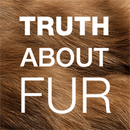






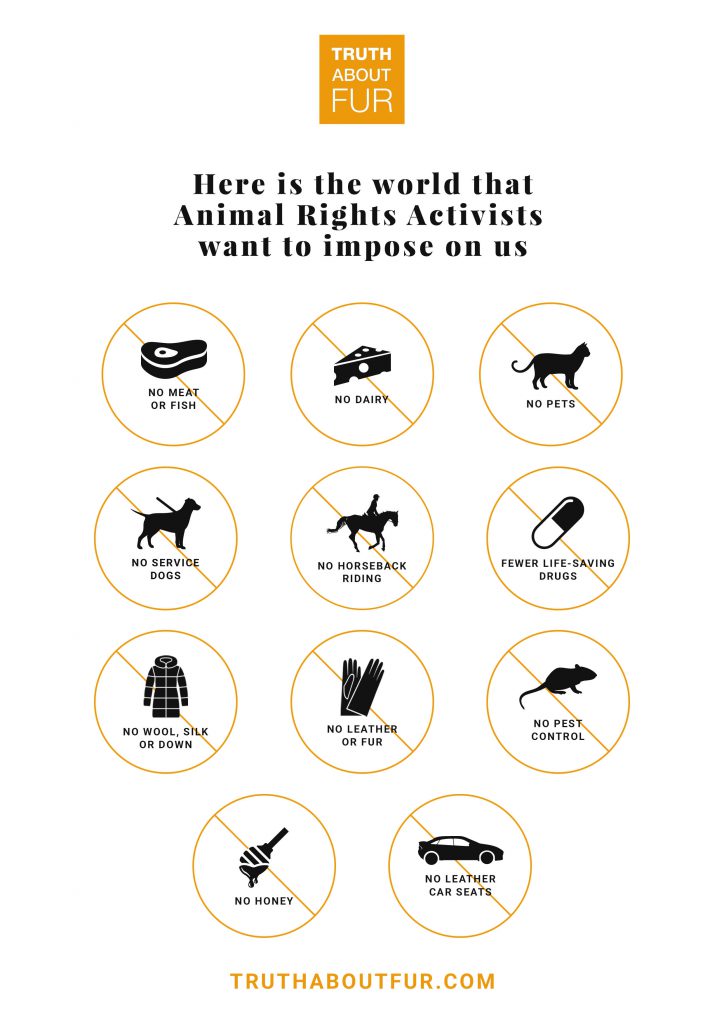
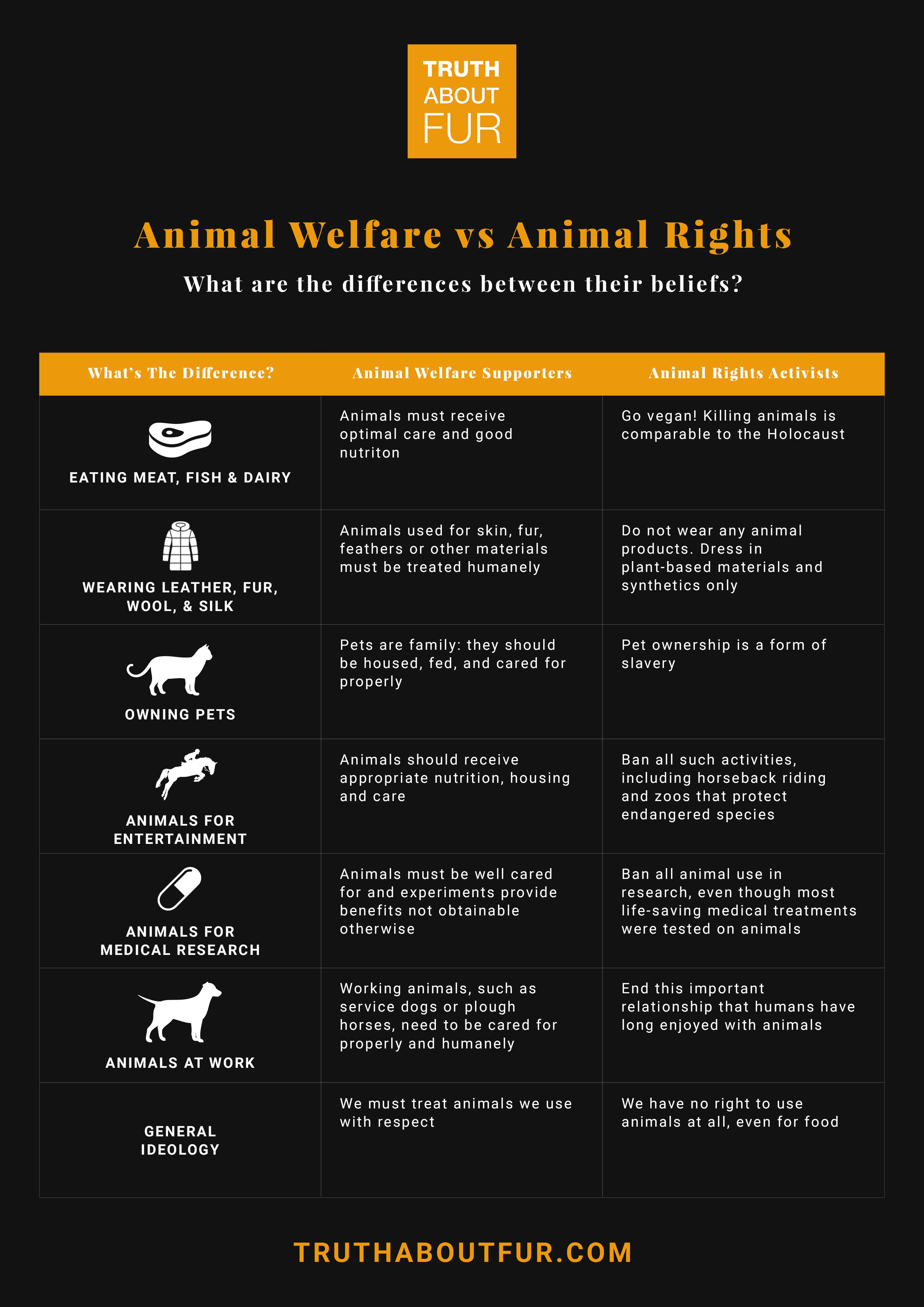


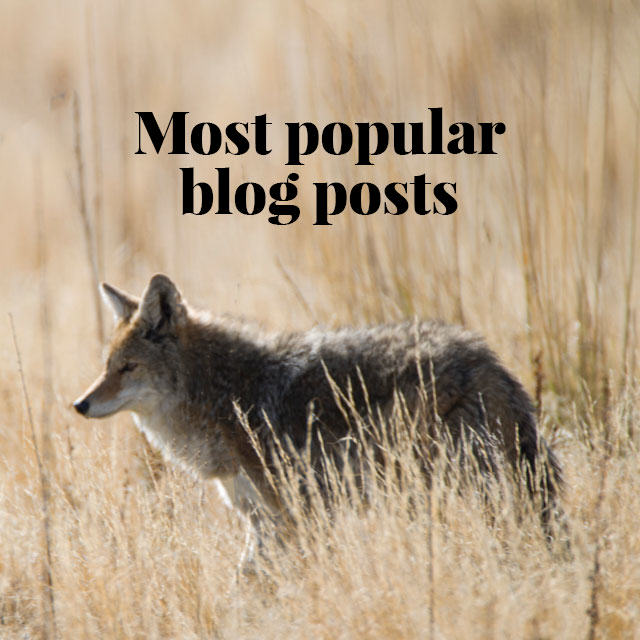

I can tell by some of these comments that, these people live on the 33rd floor of an apartment in a sprawling, ever expanding metropolis. Some may commute with EVs or Uber. They have no grasp on real life.
Humans live in a cave called civilisation in order to nurture our kind, safe from the mindless violence of nature. Inside our human cave, we have human rules called ethics and morals. They in turn give us human rights because we are born in the human cave called civilisation. Rights are something we humans all own from birth.
Outside the cave, there are no morals, no ethics and no rights. Animals kill and eat each other all day long as a normal part of their lives. If an antelope had rights, we would have to stop a lion killing it. But that would take away the lion’s rights. So, we give them back to the lion and take them from the antelope. It is a silly game. There are no rights in nature – that’s why we invented civilisation, to protect us from the violence.
Welfare is something else. It is something we humans can give to animals. They are not born with it. It is our gift to them. If we are well-fed and protected, with a high standard of living, we tend to give them more welfare. If we are hunter-gatherers and poor, we tend to give them less welfare because we need to use them for food and clothing. We all love animals whether we kill them or not.
We humans give different welfare to different animals – a pet dog, a sheepdog, a cart horse, a chicken and a rat are all given different welfares – as companion, working dog, beast of burden, food and pest respectively. It is not automatic, and none are born with rights. Our gift varies.
Our human cave needs resources and we take those resources from nature – animal, vegetable or mineral. Those resources have no rights – it is merely prudent not to use them all up.
Animals are simply a living resource that we use – we even kill them in order to grow vegetables or build cities or make smart phones. We cannot avoid killing animals, so PETA’s concept of never using them is simply weird, without any connection with reality. We humans have been predators for the whole of our history.
You are welcome to be a vegan or support PETA or any other belief – they are your beliefs, inside your head, not outside in nature, and I don’t share them. Most of us don’t in reality.
But you can have the luxury of these beliefs because you are a cave dweller, cut off from nature, and other people do your killing for you.
–
This is one of the most biased articles I’ve seen. Anybody can see that you clearly have an agenda against animal rights and are clinging to welfare in an effort to pretend that fur can possibly be ethical. It’s people like you who deny that there’s pain when animals have their throats slashed for meat or the various ways animals in zoos and horses for riding are abused without common public knowledge. If you want to sound more genuine you have to frame your words cause it reeks of bias. Providing animals with care and shelter doesn’t suddenly make forcing them into labor okay, nor killing them for meat or skin. You also blatantly disregard the flaws of domestication and villify the animal rights movement without even considering their points. The reason we reject animal usage is because they’re not objects to use. You can’t own or control them like an accessory, they have more worth beyond these.
i believe that animal welfare should be implemented. because by implementing animal rights, economies would fail, there would be food insecurity most especially on developing/third-world countries whose small and subsistence farmers household depend on mixed livestock-crop farming would definitely lose their source of food (protein). although there are plant-based proteins, its availability and accessibility is still not enough for every poor subsistence farming household to survive. aside from that, these animals can be a source of income for them.
In an animal rights world the transition will be slow, anybody who works in animal agriculture will become crop farmers and help make plant protein crops accessable (all protein and essential nutrients exist in crops, fungi, and supplements, the latter is already used by vegans and non-vegans alike). Industries and economies always move on. The problem is that animal domestication and slaughter is already too normalized, with more vegans, less animals will be bred into literal industrial holocausts. Obviously select few groups in the third world and indigenous groups still need animal consumption for survival but this doesn’t apply to the majority. We’re morally obligated to live without consuming and killing them, there’s no nice way to kill when we lack survival necessity for it. Animal welfare is inherently flawed because it allows these inherent cruelties while rights recognizes animal individuality and abolishes animal slaughter and their dependency on humans.
This article will help me a lot with my school project. I agree that animals should be treated fairly and when killed it should be as quick and painless as possible. I don’t get why people think shearing sheep and milking cows is bad. Cows need to be milked because, it could cause bruising, udder injury, sickness and, if it continued, could result in death. Sheep need to be sheared to keep them healthy and allow them to live comfortably through the changing seasons. The ability to shed naturally has been bred out of most breeds of sheep which makes shearing an absolute necessity.
I most definitely lost a few brain cells reading this. Animal rights don’t want to ban pets or service dogs. There is no such thing as a humane slaughter either, you stupid animal welfare xxxxx. x
I have literally never heard anyone say having a pet is slavery? Anyway, hope the red meat clogs up your arteries hehe xx
If you’ve never heard animal rightists say such things, it only indicates that you’re not well read. Try Googling Peter Singer, Ingrid Newkirk or HSUS’s former director Wayne Pacelle. There’s loads of stuff out there likening pets to slaves.
Pets don’t choose to be domesticated, and people do use them as living accessories often in the same way people use slaves. It’s not exactly the same but very similar. A lot of pets are neglected just cause people grow tired of them as if they’re toys, or they’re put to work such as being used by police and military. It’s dangerous and stressful for them.
I agree with most….but what are you going to do with pets then? Dogs can’t live in wild.
Also endangered animals that are in shelters are safe from wild hunting.
You mean they are safe from poaching, sustainable hunting actually helps endangered animals conservation, hunters also fight for the end of poaching.
That’s completely stupid and hypocritical, the people who kill some animals against people doing exactly what they do but to other animals. It’s beyond brainless to fund conservation by hunting, it’s no different than having a hitman kill someone and then the hitman gives the money to charity, all you do is trade one life for another.
This is because domestication prevents them from living in the wild and makes them reliant on selfish humans who treat them like accessories. Domestication is against nature to begin with, we domesticate to make it easier for us to commodify and exploit animals, now we reached a point of no return.
Wow, I had no idea that animal-welfare advocated think that having a pet is a privilege and it brings on responsibilities. My daughter loves horses and she has been doing some research for one of her school projects about the protection laws that apply to them. She asked me to look for advocacy groups that we could pledge and donate to so we can become more conscious.
Animal welfare doesn’t consider animals as individuals, it objectifies them as accessories, tools, or goods. Animal rights is what rejects this concept.
I agree to some degree. I do not feel that in the world we live that animals need to be raised for the use of their skin or fur.it is antiquated. Very few areas in this world need to use animal fur to clothe themselves. And those that do use every part of the animal. Nothing is wasted. In the fashion industry it is just for profit only and most of these animals are treated horribly.
Thank you for your opinions, Susan. You’ll understand that we don’t quite see eye to eye. With specific reference to the North American fur trade, which we represent, there is very little waste indeed, and that’s actually true for all livestock industries. It’s also not true to say that the animals – farmed or wild – are treated “horribly”. Animal welfare standards on mink farms, for example, are surely among the highest of all livestock industries. Last but not least, please don’t fall into the trap of thinking “profit” is a dirty word. When it comes to capitalist economies – which means almost every economy on the planet today – it’s the pursuit of profit that keeps the wheels turning, creating jobs and putting food on the table. Rest assured that no one these days is getting obscenely rich off fur.
This is extremely biased. Animal welfare isn’t as flawless as this article makes it seem.
I agree
its actually annoying how bias this is lolz
Exactly, the website is made by people who profit off of animal products so they have to lie and cheat to give the impression that they’re morally in the clear. You can see how much bias is in their diagram where they childishly mock animal rights and only have a one sided analysis.
There exist alternatives to all uses of animals. For example, faux fur, leather and wool are popular, and a plant-based diet is delicious and healthy. In addition, there are less expensive and more effective alternatives to testing on animals because non humans do not react the same way to drugs as humans do. Moreover, sentient, living non-human beings should have the same legal status as children and mentally challenged individuals who cannot reason like most human beings.
Please understand, Carol, that not everyone agrees with you. For example, almost all nutritionists consider a vegan diet to be unhealthy for children, almost all medical researchers (and the governments which regulate them) still believe in the importance of animal models, and almost no one thinks animals should have the same legal status as children and the mentally challenged.
You’re wrong on so many levels, but I’ll start with your untruthful comment about “nutritionists saying vegan is unhealthy”, check out the American Dietetic Association quote here “
It is the position of the American Dietetic Association that appropriately planned vegetarian diets, including total vegetarian or vegan diets, are healthful, nutritionally adequate, and may provide health benefits in the prevention and treatment of certain diseases. Well-planned vegetarian diets are appropriate for individuals during all stages of the life cycle, including pregnancy, lactation, infancy, childhood, and adolescence, and for athletes.“ You represent a fur trade and you think people should believe what you’re saying about vegans? You’re biased and grossly untruthful and misinformed. Vegans don’t say we shouldn’t own pets. Humans have caused overpopulation, so it is our duty to take care of these animals, that’s why we rescue. Get a grip. You want to spread lies so you can continue making money off the suffering of animals. How low can you go?
Hi Cindi, I’m afraid we must stick with our comment that “almost all nutritionists consider a vegan diet to be unhealthy for children”. Note that we say “almost all”. Perhaps we should also have used “infants” instead of “children”.
A world where no animals are abused or killed is possible! At this age we don’t need animal skin to cover ourselves. We don’t need our car seats to be made of calf skin. We don’t need animal flesh to feed ourselves. List goes on.
Your article is full of biased and untruthful remarks. It disgusts me to see how you are ignorant and glorify the violence and abuse.
Well, let’s be honest, Vic. Are your comments entirely “truthful” and in no way biased? The debate over animal rights is not, and probably never will be, based on irrefutable facts. It’s based on values, opinions, and different shades of grey. It’s sad that just because some people don’t share your values, you must brand them as “biased”, “untruthful”, “ignorant”, etc. They just don’t agree with you, and you need to try to accept that.
I can easily frame your logic by saying “It’s sad that you don’t agree with serial killers. The debate over human rights and not killing humans is based on values, opinions, and shades of grey. It’s sad that you must brand serial killers as biased, untruthful, or ignorant jsu because they don’t agree with you.”
There’s no such thing as a right or freedom to oppress a sentient being, it contradicts the purpose of rights to begin with. You are correct in one aspect, morality is an opinion. It’s based on the fact that sentient beings can suffer but whether or not it’s right or wrong to kill a sentient being is an opinion that’s universally agreed upon. If that can be agreed upon with humans it logically should for animals too. You can use any excuse that you use to justify killing animals to kill humans too, cause sentience and the capacity to feel pain is constant and unchanging for the most part. The vast majority of animals including the ones slaughtered for your precious fur are as intelligent as human children.
Well said…yes!
Personally, if we were to stop the livestock industry, the animals wouldn’t be getting proper nutrients out in the wild. They would die off, which for someone who is activating for animal rights, seems like the opposite. Also, the economy would fail. Meat, eggs, and dairy are main components to our economy and farmers are making sure that their livestock are well kept so that the economy doesn’t falter.
Slavery was once a main component of our economy too. Industries evolve. There is NO reason to continue doing what we’re doing to animals. We can be much healthier on a plant-based diet, even reverse diseases like heart disease, type 2 diabetes, certain cancers, and we sure as heck don’t need animal skins or furs for clothing.
I agree. I went into this article thinking it would be more open-minded since the site is called “truth about fur” but boy.. this is so biased I’m disappointed
The title is a hint that they’re funded by the fur industry, they have to lie their way through to keep their means of money intact.
If you believe animals should NOT suffer abuse and torture….. for humans to profit from….. you’ve taken the first step towards being a believer in animal rights.
If you believe animals should suffer abuse and torture….. for humans to profit from…… you definitely don’t believe in animal rights OR animal welfare.
Not too complicated.
Logical error detected.